Some projects receiving federal funds for economic development near abandoned mines have strong community support; others, not so much
Kevin Ridder | October 11, 2019 | No Comments
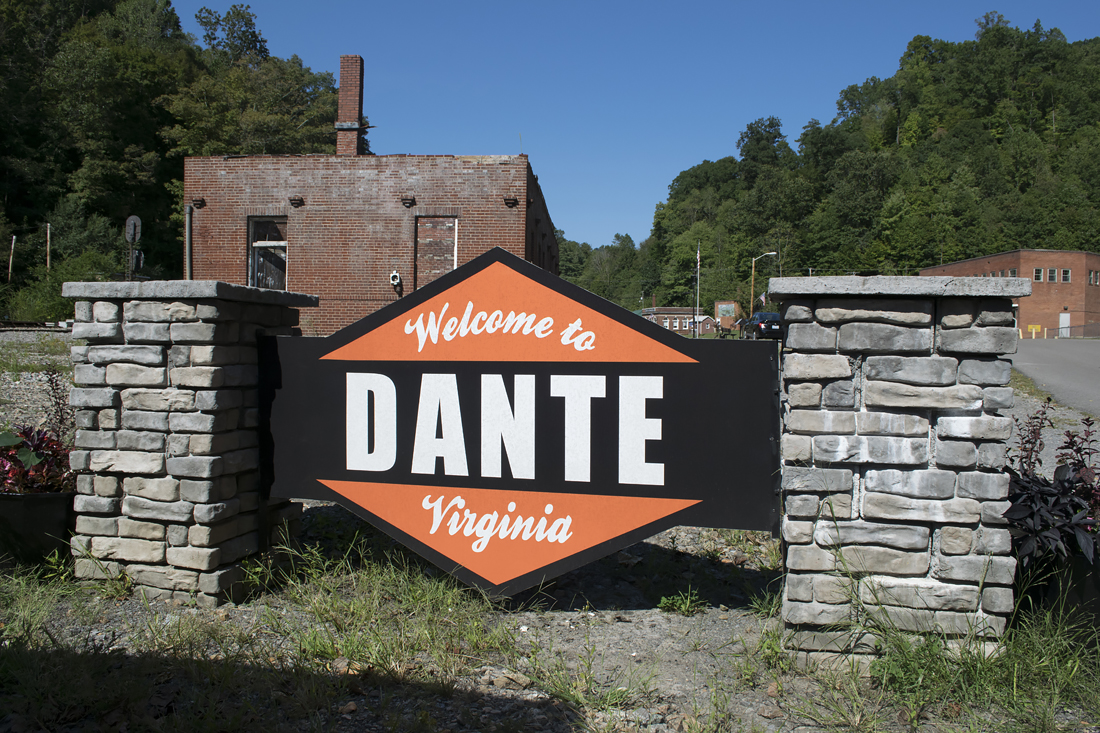
The community of Dante, Va., is building a walking and biking path and an ATV trail with AML Pilot funds. Photo by Kevin Ridder
Once the headquarters of the Clinchfield Coal Corporation, the unincorporated community of Dante, Va., (rhymes with “paint”) in northwestern Russell County suffered with the decline of the coal industry. Once a thriving community of 6,000 with multiple stores, a hospital, a movie theater and more, Dante is now home to roughly 800 people.
“It’s the same sad story around Southwest Virginia,” says Russell County, Va., resident Jarred Glass. “The town was built on coal. That’s all it knew was coal, that’s what it relied on. There’s never been any other mechanism for anything else to have any draw to Dante.”
In early 2016, Glass, along with Dante residents and Russell County District Two Supervisor Lou Ann Wallace, set out to revitalize the area and formed the Dante Community Association, which began to gather local input on how to improve the area. The group saw a chance to breathe new life into Dante when Abandoned Mine Lands Pilot funds were made available in Virginia in 2017.
AML Pilot is an offshoot of the Abandoned Mine Lands program, which was created by the 1977 federal surface mining law. The law requires coal companies to pay a fee to the U.S. Office of Surface Mining Reclamation and Enforcement for each ton of coal produced. The federal agency then distributes annual payments to states and tribes to remediate mines that companies abandoned before the 1977 law went into effect.
After repeated calls to accelerate Appalachian mine remediation, Congress created the AML Pilot program in 2016. Today, the program authorizes annual payments from the U.S. Treasury, not the AML fund, to six Appalachian states and three tribes in an effort to foster economic development near mines abandoned before 1977. The states of Kentucky, Pennsylvania and West Virginia received $25 million each from the AML Pilot program in 2019, while Alabama, Ohio and Virginia received $10 million apiece. The Navajo Nation, Hopi Tribe, and Crow Tribe each received $3.3 million. Unlike the traditional AML program, no environmental remediation is required for projects funded through the pilot program.
Some of the projects funded by the program have occurred with community input and been well-received. In other cases, communities left out of the process have found that the pilot grants are going to projects supported by local elites with little grassroots support.
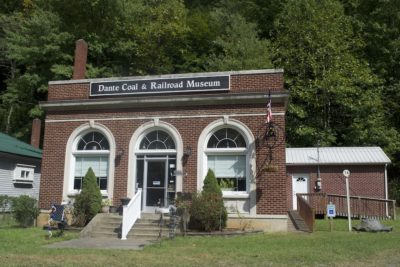
The trail would go behind the historic Dante Coal & Railroad Museum, allowing hikers to stop and learn about the community’s history. Photo by Kevin Ridder
In March 2019, Virginia awarded the association $269,000 in AML Pilot funds to seal several mine portals and to convert former coal-transportation infrastructure into an 8-mile walking and biking path, and a 30-mile ATV trail expected to connect with trails in the nearby town of St. Paul.
“We’re left with all these old railroad tracks and tram roads and everything else,” says Glass. “The tracks and all those things are gone, but we’re left with all these flat roads, basically, that weave through the mountains. The framework for trails and things are already there.”
Glass states that ATV riding is a big draw to the area.
“If you come in to St. Paul on a Friday or Saturday morning, you’d be surprised how many people come in from out of the area to ride,” he says. “We want to be able to continue that in Dante.”
“Especially for that much mileage, Russell County and the immediate area doesn’t have anywhere like that to offer,” Glass adds.
In addition to drawing out-of-towners to the ATV trails, Glass notes that the trails will showcase Dante’s history as a coal town. Although the mine portals will be closed, the entrances will be cleaned off to give trail-goers an idea of what they looked like. The trail will also go right behind the Dante Coal and Railroad Museum.
Jarred Glass describes local talk of opening up short-term rentals and possibly putting in a campground.
“They’re looking at the big picture of the next few years of what Dante could look like,” says Glass.
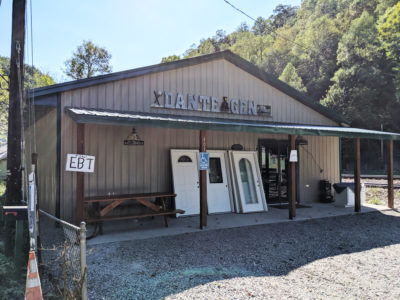
The newly opened Dante General Store is the first shop in the community in more than a decade. Photo by Kevin Ridder
“We come up here and built this right here, no planning whatsoever, the Lord just spoke to us and said go help them people,” says Dennis Porter.
A former coal and hard rock miner, Porter says that Dante was “a thriving town” when he got his first job in the coal mines in the 1970s. Knowing that much of the community’s population was aging and dealing with problems related to poverty, the couple set out to give back to Dante.
Dennis Porter says that the Dante Community Association is “a wonderful thing,” and especially lauds county official Lou Ann Wallace’s help in starting to get Dante back on its feet.
“These people here are struggling,” says Porter. “I didn’t have no idea just how bad it was. So we’re going to try and dedicate all the service we can to help them. With Lou Ann’s help, we can make it work.”
Joey James is a senior strategist with Downstream Strategies, a consulting firm that has assisted several communities applying for AML Pilot funding. He states that the program grew out of a pillar of former President Barack Obama’s POWER+ program.
“Unfortunately, the POWER+ program didn’t come out in the way that we expected it to, but, good for us, there were people within Congress that saw the value in economic revitalization of these under-utilized and often harmful sites,” says James. “The whole idea was to pilot the idea of having some sort of economic development program aimed at revitalizing these specific areas.”
According to James, AML Pilot is much more open to the public than the traditional AML program.
“These are projects that are supposed to have originated from innovative thinkers within these communities, whereas projects through the traditional AML program, which is important, are often coming on recommendations from state agencies,” he says, noting that economic development is not typically a part of traditional AML projects.
James explains that each state has a large amount of discretion as to how they distribute AML Pilot funds so that each state can decide whether to prioritize environmental cleanup or economic development.
But this level of discretion can lead to questionable AML Pilot projects, especially when states don’t seek out public input.
“If there’s not as much public outreach, I think it leans more towards a political decision to fund certain projects — or it comes down to pure nepotism,” says James, noting that Kentucky is “ground zero” for these types of issues.
The AML Pilot program is similar to the RECLAIM Act, a bill supported by Appalachian Voices and others that would accelerate the distribution of $1 billion from the AML fund to states and tribes for projects that involve both mine reclamation and economic development. The U.S. House Natural Resources Committee passed the bill in May, and it has yet to receive a full House or Senate vote. The bill had 65 cosponsors in the House and six cosponsors in the Senate as of press time in early October.
While the AML Pilot program does not require community input before allocating funding, the RECLAIM Act would mandate a process for public engagement before funds are released. And while projects under the pilot program frequently include environmental remediation, they are not required to do so, whereas remediation would always be required under the current RECLAIM Act.
On Sept. 5, U.S. Rep. Hal Rogers (R-KY) and Kentucky Gov. Matt Bevin announced $34.4 million in AML Pilot funds for 20 economic development projects in Eastern Kentucky that include a children’s hospital and a drone testing facility. The funds, as well as several other grants, were announced at the 2019 Shaping Our Appalachian Region, or SOAR, Summit in Pikeville. One of the AML Pilot grants provides $2 million towards new infrastructure for the southern portion of the Martin County Water District.
The rural county has struggled with leaky and contaminated water lines, water outages and more for years. But Ricki Draper with local group Concerned Citizens for Martin County states that the money will not be a boon for residents, and that it won’t be enough since fixing the district’s water problems would cost an estimated $13.5 million. Most of the new $2 million grant is slated for a new booster pump station and a 250,000-gallon storage tank that Draper says will primarily be used for a high-security federal prison.
“They say it’ll help the residents and increase revenue because it’ll be able to provide water to the prison, but the prison has always been promised as a cash cow and has never delivered,” says Draper.
According to Draper, the problem that most Martin County residents want to see addressed is repairing residential water lines — and none of the AML Pilot money has been earmarked for that purpose.
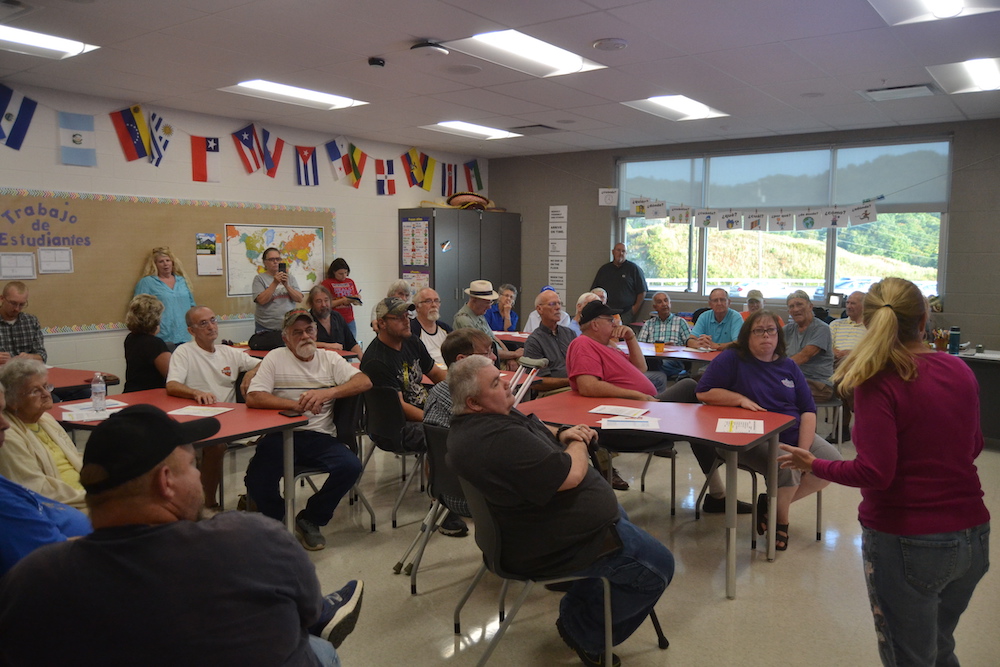
About 40 reidents attended this Sept. 12 Martin County Concerned Citizens meeting to discuss how to address the area’s numerous drinking water problems. Read the group’s new water affordability study for Martin County online here. Photo by Roger Smith/The Mountain Citizen
As for 2019 AML Pilot grants, officials allocated $3.37 million in AML Pilot funds for the Eastern Kentucky Business Park in Martin County. The money would be used to build and renovate infrastructure in the park including the construction of a 33,000-square-foot facility for future interested companies.
Three facilities are currently sitting empty on the 300-acre site, and only two companies are in operation there.
As far as the planning process for AML grants, Draper states that public officials need to ask the community what is needed.
“There is zero participation as far as public input from residents,” says Draper, noting that many community members expressed outrage about the projects at a Sept. 12 community meeting.
“A lot of people were saying we don’t need this, that this money just keeps going to the same people and the same projects; it doesn’t help the community,” she continues. “I think really only the local elites are in favor of this.”
Nina McCoy, chairperson of Martin County Concerned Citizens, argues that AML Pilot money should be used to help the community rather than large businesses.
“It is high time the voters of this region demand a new vision for how to use public money for the common good,” said McCoy in an email. “No self-respecting industry will move good jobs to an area where their workers cannot depend on safe, clean, reliable drinking water.”
In June, the U.S. Bureau of Prisons withdrew plans to build a $510 million federal prison on a former mine site in Letcher County, Ky., stating that more analysis of environmental concerns was needed. Kentucky awarded the project $4.5 million in AML Pilot funds in late 2018 to build water infrastructure for the prison and surrounding homes.
Attorneys filed suit against the agency in November 2018 on behalf of 21 federal prisoners, claiming that the prison would harm the environment and expose inmates and employees to health risks associated with the site and a nearby active coal mine. U.S. Rep. Hal Rogers has been pushing for the prison — which would have been his district’s fourth and the most expensive in U.S. history — for more than a decade.
“The only sensible reason that seems to support the [prison] is to satisfy Representative Hal Rogers’ pork barrel politics so that federal tax dollars can be spent on construction and development contracts with his constituents,” reads the lawsuit against the prison.
The Bureau of Prisons projected the facility would house roughly 1,200 inmates and create 300 jobs, which prison supporters argued the region desperately needed. But the Letcher County Governance Project, a local group formed in opposition to the prison, argues on their Facebook page that a prison would not provide positive economic development for the county.
In July, Ada Smith with the Letcher County group told The Appeal that the campaign against the prison was meant to underscore the feeling that “the federal government isn’t listening to what people want to do here.” She added that the campaign has been “a beautiful process in trying to showcase that there is a lot of interest in federal support of economic development in this region but this isn’t what people were dreaming of.”
Joey James with Downstream Strategies says the prison “goes against the spirit of AML Pilot being something that is supposedly designed to drive innovation in these rural communities, not lock us up.”
In contrast to Kentucky, James calls Virginia’s AML Pilot program the “gold standard” for projects.
“It’s actually kind of surprising, because Virginia has a smaller amount of money than what Kentucky and West Virginia are dealing with; only $10 million compared to $25 million,” he says.
In 2018, the City of Norton in Southwest Virginia received $3.5 million in AML Pilot funds to transform a 200-acre former mine into an industrial park. Appalachian Voices assisted in the grant application. A portion of the funds will be used to tear down a dangerous, crumbling highwall on-site that is adjacent to a four-lane highway.
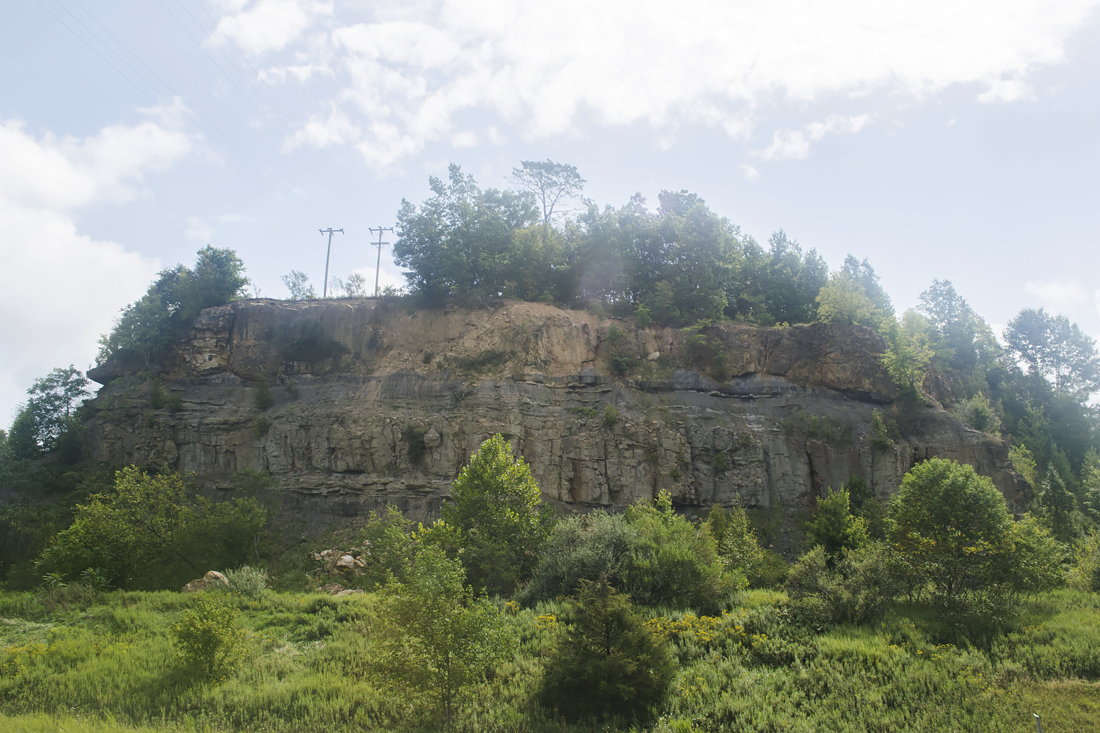
Officials plan to remove this dangerous highwall next to a four-lane highway in Norton, Va., as part of an AML Pilot project. Photo by Kevin Ridder
“Our goal is to create as many high-paying jobs that can accommodate our assets and our labor pool that we have in not just the city but in the region so we can replace a lot of [coal] jobs,” says Ramey.
Industrial parks on former mine lands are typically a risky investment since mines are usually located far from utilities and transportation infrastructure, something that the site in Norton does not lack. In addition to necessary utilities infrastructure already located nearby, Norton is situated at the intersection of two major four-lane highways.
The industrial park would be owned and managed by a regional group of local governments including Norton and the counties of Wise, Lee, Scott and Dickenson. Ramey estimates the project will create roughly 1,700 jobs once companies take up residence. Ramey expects that dismantling the highwall will begin this fall and that construction on building sites will begin in 2020.
“The biggest benefit is not just to the city of Norton,” says Ramey. “We really believe that if this is successful, it’s going to be a huge benefit to the larger region as a whole.”
Elsewhere in Wise County, a 3.5-megawatt solar farm is slated to be built on a reclaimed coal mine that was strip mined in the 1980s and power a federal data center. The project was awarded a $500,000 AML Pilot grant in 2019, and Appalachian Voices assisted with the application process. To read more about the Wise County solar farm, visit https://appvoices.org/WiseCountySolarFarm.
In late 2018, West Virginia granted $3 million in AML Pilot funds for the construction of an 8.5-mile rail-trail along the Cheat River. The funds were awarded to Friends of the Cheat, a nonprofit organization dedicated to restoring the river, which once ran orange with acid mine drainage.
“We’re excited to be able to share this river corridor with a lot of folks, to show them the work that we’ve done and what the state has done to revitalize the Cheat River,” says Friends of the Cheat Associate Director Owen Mulkeen.
Instead of environmental remediation, however, this project, like other West Virginia AML Pilot projects, will focus primarily on economic development. In addition to transforming unused railroad tracks into trails alongside the river into a non-motorized path, Friends of the Cheat plans to implement a grant program where local businesses can apply for grants up to $5,000. The organization plans to hire a part-time coordinator and start an internship program to assist with community development related to the trail.
While portions of the Cheat River watershed have been reclaimed, there remains a lot of work to be done. Mulkeen states that the trail will branch off to an area where hikers can see an open mine portal surrounded by rocks stained bright orange by acid mine drainage.
“We are doing a spur trail from there to kind of educate the public or visitors on the history of mining and reclamation in the area,” he says, adding that it would likely cost more than $4 million to clean up the portal site and that the state has yet to come up with concrete plans to address the issue.
The project has received public support.
“Local folks are excited about this, we had over 35 letters of support for this project,” says Mulkeen. “We had one from Sen. Manchin all the way down to folks who just wanted to see this project happen.”
Mulkeen states that Friends of the Cheat recently applied for AML Pilot funding to create an educational trail leading to unremediated mine portals. He says they plan to revamp the former site of a coal preparation plant into a destination-worthy trailhead by tearing up asphalt, planting native trees, and adding lighting and park benches.
This would be the second West Virginia rail-trail funded by AML Pilot grants. In June 2018, the town of Whitesville, W.Va., received $2.25 million in AML Pilot funds to build the first eight miles of the future Clear Fork Rail Trail on unused railroad tracks. The idea for the trail sprung up in a 2015 community meeting hosted by the nonprofit West Virginia Community Development Hub’s town revitalization initiative.
The town expects the trail to span a little more than 15 miles with the possibility for private bicycle rentals and shuttle services to and from Whitesville, according to The Hub.
Congress votes on whether to reauthorize the AML Pilot program annually, and has voted in favor of the program for the last three years. Each year it is approved, states are required to submit proposals for pilot projects to the federal government by Sept. 30, though some do so much earlier.
A vote on AML Pilot’s reauthorization is expected in early 2020. Meanwhile, the RECLAIM Act, which would accelerate the distribution of $1 billion from the AML fund to state and tribes for reclamation projects that also provide economic opportunity, awaited a full vote in the House as of press time.
On Oct. 31, the Reclaiming Appalachia Coalition is expected to release a new report detailing current and future projects planned for reclaimed mine lands. The coalition, which includes several environmental groups including Appalachian Voices, released a similar report in 2018. A public webinar will be held at 10 a.m. on Oct. 31 to coincide with the release of the report. Register at tinyurl.com/rac-report-webinar-2019 or visit appvoices.org for updates.
Across from the baseball field in rural Dante, Va., vegetation curls in and around an abandoned building that was once Russell County’s only high school for African-Americans. The Arty-Lee High School enrolled 126 students the year before the county’s desegregation in 1965, according to The Clinch Valley Times.
Arty-Lee received much less funding from its school district than white schools such as Castlewood High School, and it didn’t even have a library or a gymnasium. The school district repeatedly denied Arty-Lee students’ parents’ requests for more funding, around the same time that the Castlewood added a new auditorium and football field for the 1960-61 school year, the Clinch Valley Times reports.
Russell County desegregated in 1965 when many schools in the county risked de-certification due to high dropout rates.
The now-abandoned Arty-Lee building was used as a storage facility by coal companies for a time before they, too, left Dante. Boxes upon boxes of broken mine core samples still litter the floor of one dilapidated classroom as sunlight peeks through the roof.
The Dante Community Association, a local volunteer group working to revitalize the community, obtained a U.S. Environmental Protection Agency grant in 2018 to explore restoring the structure.
“Unfortunately, the estimates to restore the building were great due to the large footprint and large asbestos content,” wrote Carla Glass with the association in an email.
In place of restoring Arty-Lee High School, Glass states that the Dante Community Association will use EPA funds to remove the structure and establish a memorial in an effort to preserve the area’s African-American history.
Like this content? Subscribe to The Voice email digests